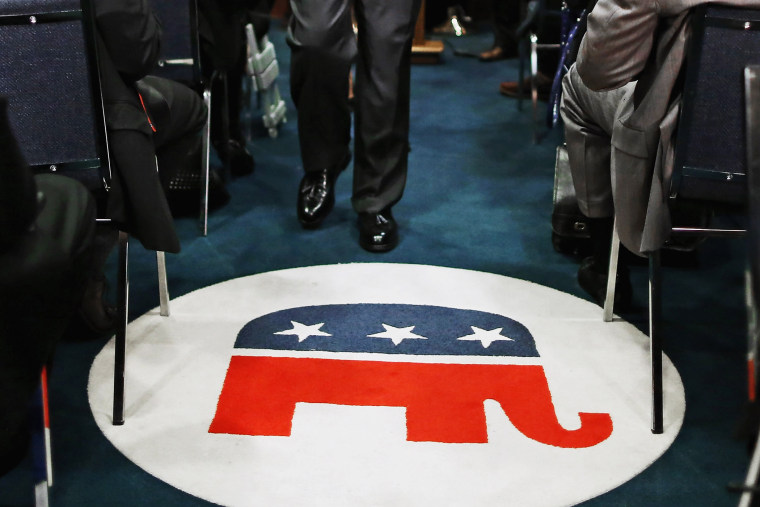As things stand, House Democrats won at least 40 seats in this year's midterm elections. They flipped seven governors' offices. Democrats lost a little ground in the U.S. Senate, but even here, Republicans fell short of their own expectations. There's ample public polling that shows the GOP agenda, such as it is, features a series of woefully unpopular ideas.
Ron Brownstein had an interesting conversation with Bill Kristol the other day in which Brownstein said, 'I am stunned by how little debate and discussion there has been by Republicans about the extent of their suburban wipeout.... I think they should be more alarmed than they are."
That would require some introspection. The New York Times reported yesterday, however, that Republicans leaders have shown little interest in "self-examination ... about why a midterm that had seemed at least competitive became a rout."
President Trump has brushed aside questions about the loss of the chamber entirely, ridiculing losing incumbents by name, while continuing to demand Congress fund a border wall despite his party losing many of their most diverse districts. Unlike their Democratic counterparts, Republicans swiftly elevated their existing slate of leaders with little debate, signaling a continuation of their existing political strategy.And neither Speaker Paul D. Ryan nor Representative Kevin McCarthy, the incoming minority leader, have stepped forward to confront why the party's once-loyal base of suburban supporters abandoned it -- and what can be done to win them back.
New York's Elise Stefanik, one of only six U.S. House Republicans still serving in states north of Pennsylvania, told the Times, "There has been close to no introspection in the G.O.P. conference and really no coming to grips with the shifting demographics that get to why we lost those seats."
All of this suggests Republicans are content to look at the 2018 results as a fluke, if not a triumph. The intra-party goal isn't to fix what ails the GOP, bur rather, to simply ignore the party's problems and wait for the political winds to change direction.
If this dynamic sounds at all familiar, there's a good reason for that. In 2006, after a Democratic wave washed out the Republicans' congressional majorities, GOP officials made no meaningful changes to their agenda. The Bush administration, whose failures in the Iraq war helped drive Democratic gains, increased troop deployments after the midterms.
Two years later, after another Democratic wave, Republicans again discounted the results, moved to the right, and decided to reject any and all attempts at bipartisan outreach.
In 2012, after the GOP lost the presidential popular vote for the fifth time in six cycles, the Republican National Committee finally found itself in an introspective mood and conducted a detailed "autopsy" of what went wrong. The resulting document encouraged party leaders to pass comprehensive immigration reform, moderate their position on the culture war, and start reaching out beyond just conservative media organizations to get the party's message to the public. Republicans ignored the recommendations.
But just as important as the cycles in which Republicans lost and refused to change course are the cycles that soon followed, in which they won. The GOP stuck to its regressive vision after losses in 2006 and 2008, and voters rewarded the party in 2010. Republicans ignored their own "autopsy" after the 2012 elections, but they nevertheless gained power in 2014 and 2016.
The GOP's strategy is predicated on the assumption that changing course is never really necessary, since the pendulum will swing back whether they invest any effort or not. Republicans won't make any meaningful changes unless and until the electorate gives them no other choice.
Historically, there's a model that follows a predictable pattern: a party moves too far from the electorate, suffers a series of setbacks, and feels motivated to overhaul its agenda to win back voters' support. Republican politics has largely been radicalized in recent years, but there's been no need to change course because their setbacks have been followed soon after by victories.
It's no wonder GOP leaders are shrugging off their 2018 losses; they're assuming a fickle electorate may change its mind in a couple of years -- and if not, the party will simply impose new voting restrictions to make sure they can't lose.
For Republicans to feel motivated to dramatically change course, the party will have to lose several election cycles in a row. Losing control of the House this year stings, but it won't shake GOP assumptions about the wisdom of the party's far-right vision.
